Kevin Clarke
Operetta Research Center
9 April, 2020
The Drama Review (TDR) is planning a special issue on the developments in the German theater scene from 2010 to 2020. One of the points of interest will be the queering of operetta in that decade, with a special focus on Barrie Kosky and his work at Komische Oper Berlin from 2012 onwards when he became artistic director of the company and started his spectacular operetta revival project with Paul Abraham’s Ball im Savoy, soon followed with shows by Oscar Straus, Nico Dostal, Emmerich Kalman, Mischa Spoliansky, and Jacques Offenbach. In preparation for this TDR project we, here at the Operetta Research Center, asked three musical theater experts from different corners of the world how they experienced the queer operetta revolution in Berlin. Here are the answers of our UK correspondent John Groves, Berlin’s Irish Times correspondent Derek Scally, and Broadway historian Richard C. Norton from New York.
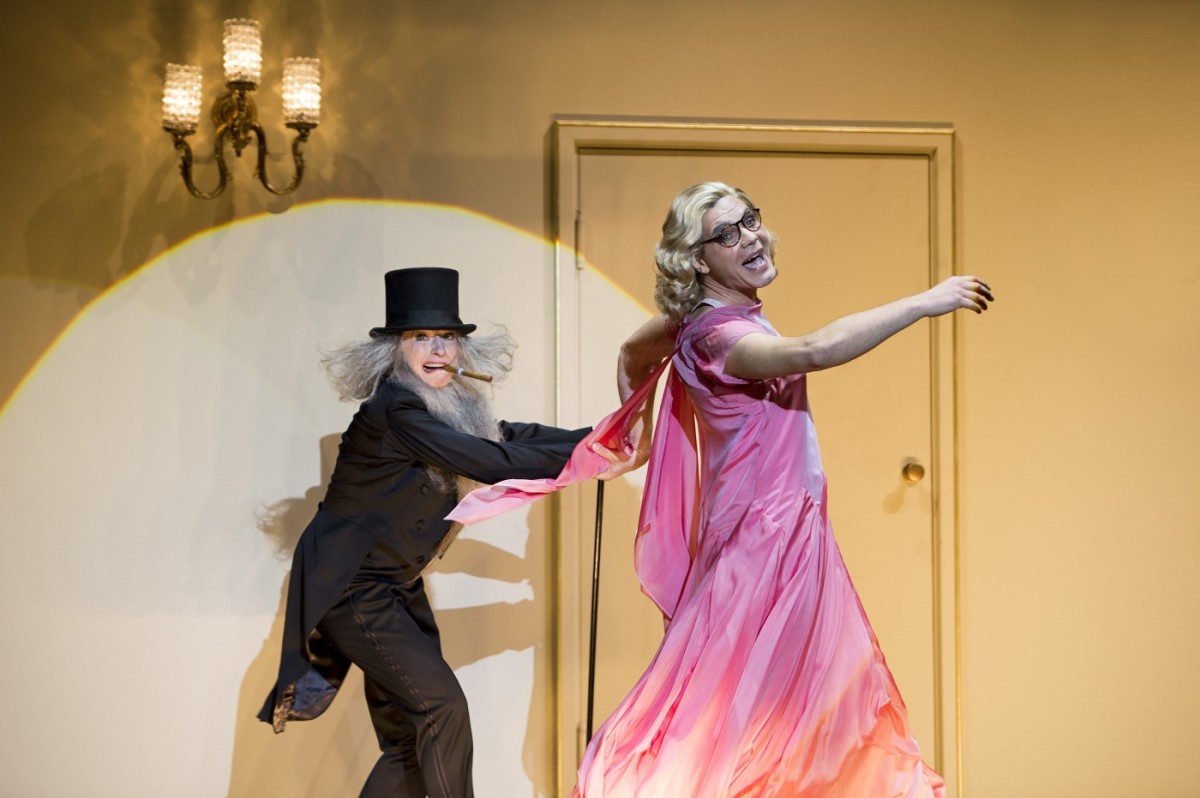
One of the many cross-dressing moments: Dagmar Manzel and Max Hopp in a scene from “Eine Frau, die weiß was sie will”. (Photo: Iko Freese drama-berlin.de)
From an international perspective, what are the particular elements you’d describe as “queer” in the operetta productions Komische Oper Berlin has been successful with in the 2010s?
John Groves: Only really the cross dressing aspects, which in Britain we’re quite used to both in pantomime and in opera itself. Some of the Berlin operetta productions are very “camp,” such as the roller-skating chorus boys in Belle Hélène, but always extreme funny! The Sadler’s Wells Offenbach productions of the 1960s were equally camp, just look at pictures of Kevin Miller and the translations which were full of double-entendres!
Richard Norton: On the basis of the operettas I’ve seen at Komische Oper (Ball im Savoy; Clivia; Eine Frau, die weiß, was sie will; Marinka; My Fair Lady; Die Perlen der Cleopatra; and Ritter Blaubart), I recognize Kosky’s distinctive “house style” that is “queer friendly,” whether or not the particular production was directed by Mr. Kosky or not. When these musical theater works were first written and produced from the 1860s up until 1956, any openly “queer” sensibility was minimal/secondary, and the libretti/narrative typically celebrated/observed heterosexual behavior. Even if the stories featured disguises/gender switches/mistaken identity, “queerness” is but one of many modern directorial tools at Kosky’s disposal. The casting of Geschwister Pfister, the use of male (not female) pony dancers, even the re-writing of Eine Frau, die weiß, was sie will for two virtuoso actors … none of these make an operetta “queer.”
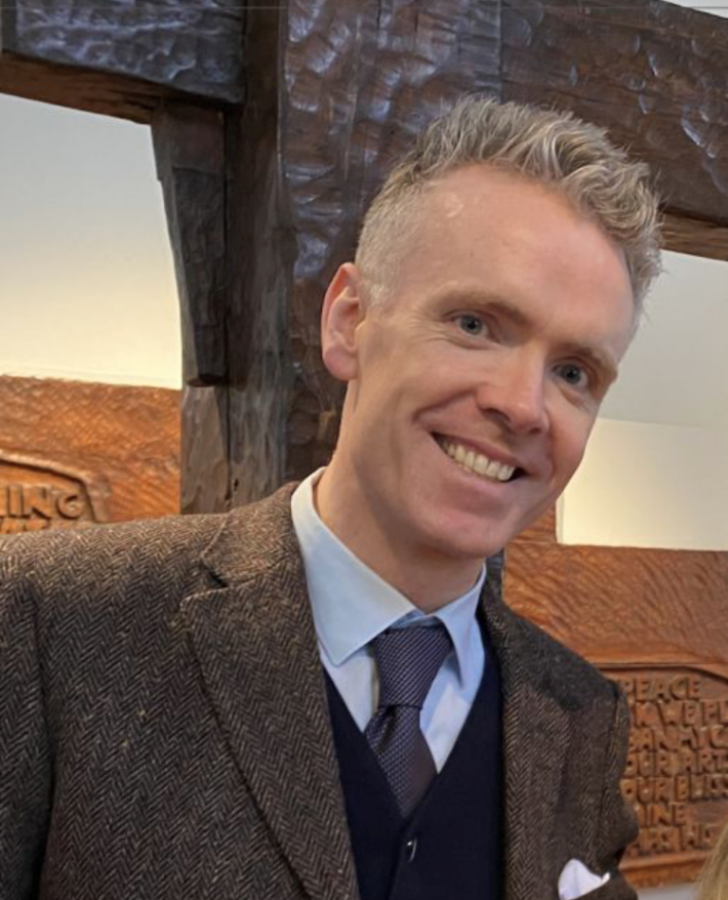
“Irish Times” correspondent Derek Scally. (Photo: Private)
Derek Scally: Barrie Kosky’s productions are one long gender-bender. He’s taken a traditional, East German audience and confronted them with new-to-you productions of old works that have smashed open the windows to the present. In the classic salesman mode, he sold them something they didn’t realize they wanted. And they loved it. I think he has taken a light approach: shown queer to be a broader lens of looking at artistic material, and life itself. Not even the East Berlin pensioners feel intimidated by cross-dressing chorus boys anymore.
Even The New York Times reports on Mr. Kosky’s productions regularly and enthusiastically. Why this international interest in “Berlin style” operettas? What’s so fascinating about these shows: is it the “Weimar Republic” bonus?
Derek Scally: I think the productions are attracting attention because they are technically strong, with clear directorial ideas, but also because the repertoire is “new” to modern audiences. The Weimar twist is interesting to a journalist like me, a familiar hook for commissioning editors and audiences familiar with Cabaret. But that is a flash-in-the-pan issue that doesn’t account for his sustained success, coverage and interest from outside. I see his success based on a common story: it takes an “outsider” to see the value and beauty in things neglected or overlooked by the natives. It’s hard to believe now how neglected Paul Abraham or Mischa Spoliansky were before Kosky came along.
Although I am not a fan of all of Kosky’s productions, I have huge respect for how he’s taken such cultural riches out of a post-war memory hole and put them back on-stage, where they belong. I’m amused to watch other theatres here now racing to do their own productions, which makes me want to ask these largely German directors: “What took you so long?”
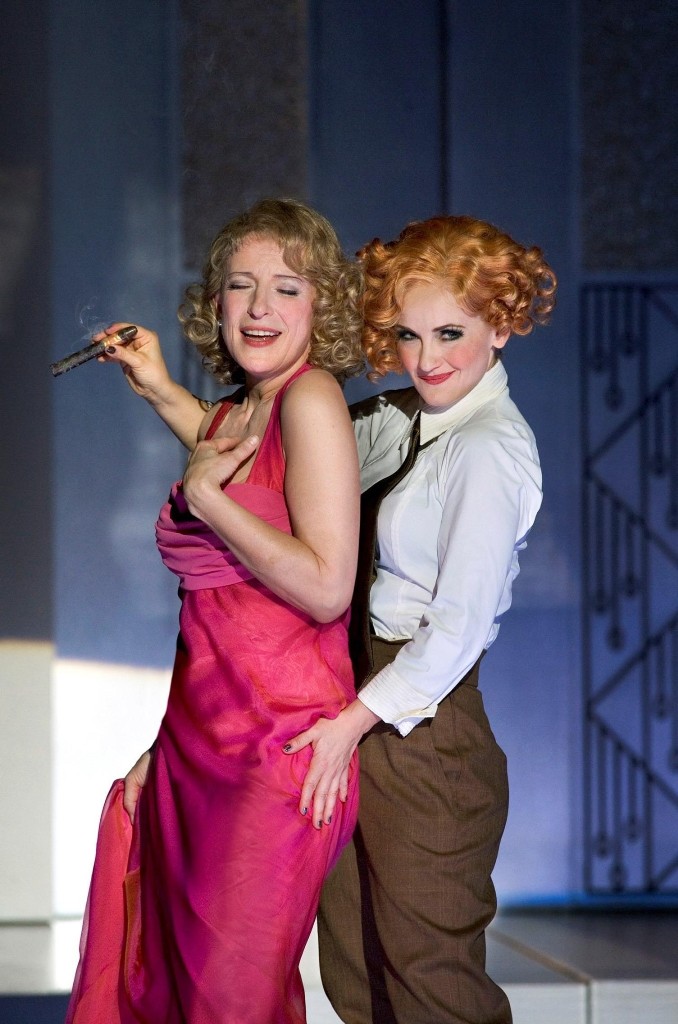
Dagmar Manzel (l.) and Katharine Mehrling in “Ball im Savoy,” Barrie Kosky’s production at Komische Oper Berlin. (Photo: Iko Freese / drama-berlin.de)
What’s your explanation?
Derek Scally: I think there is an interesting doctoral thesis to be written about why German theatre directors, who like to consider themselves cutting edge, refused to see – or were blind to – the theatrical treasures under their noses. The absence of these productions from Germany’s cultural canon was like Hitler’s last revenge. Entire generations of German directors were – either through ignorance or cowardice – continuing the Nazi purge. It amuses me greatly that it took a gay Jewish director from Australia to put an end to that.
Richard Norton: The words “Weimar Republic” are perhaps a more recognizable portal for international visitors, much in the way that the Kander & Ebb musical Cabaret and its film version work. Mention the names Paul Abraham, Nico Dostal, Friedrich Hollaender, Oscar Straus, Fritzi Massary etc. to 99 percent of American musical theatregoers and they’ll look at you bewildered; you’ve already lost their attention.
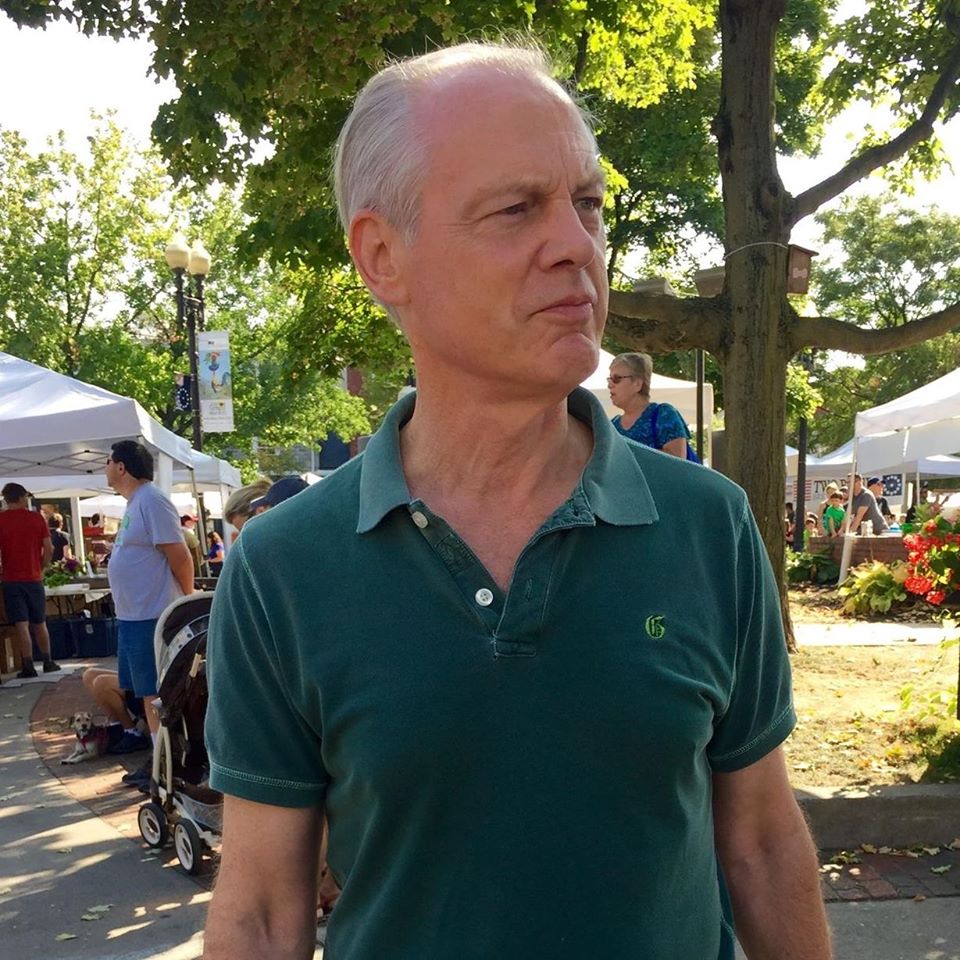
Broadway historian Richard C. Norton. (Photo: Private)
Even though Mr. Kosky has sold-out houses with his productions, bringing in new and divers audiences, the big operetta companies in the USA and UK have not followed his example. Why this “aversion” to the Berlin style?
Richard Norton: “Aversion” is a strong, even inaccurate word; I think “indifference” or “ignorance” are more correct. Were Barrie Kosky to be invited to direct an operetta in the USA or UK, or his native Australia, what would he be asked to do? Probably Fledermaus or The Merry Widow; note I didn’t say Die lustige Witwe. Does his free time and Komische Oper contract permit such outside activities? Has the Komische Oper toured its “queer friendly” productions abroad? Not really, otherwise I wouldn’t have had to travel to Berlin regularly to see them.
John Groves: Change always takes a long time! And typical Komische Oper operetta titles do not always travel well – for example Ball am Savoy at Nurnberg recently came over as a bit half-hearted in a production by Stefan Huber, even though he had some of the Berlin stars in lead roles. It still didn’t work! Also, at the moment, there is no money around, and all companies are playing safe. German theatres on the whole have bigger subsidies than any others in the world – but even the regional ones have to play safe!
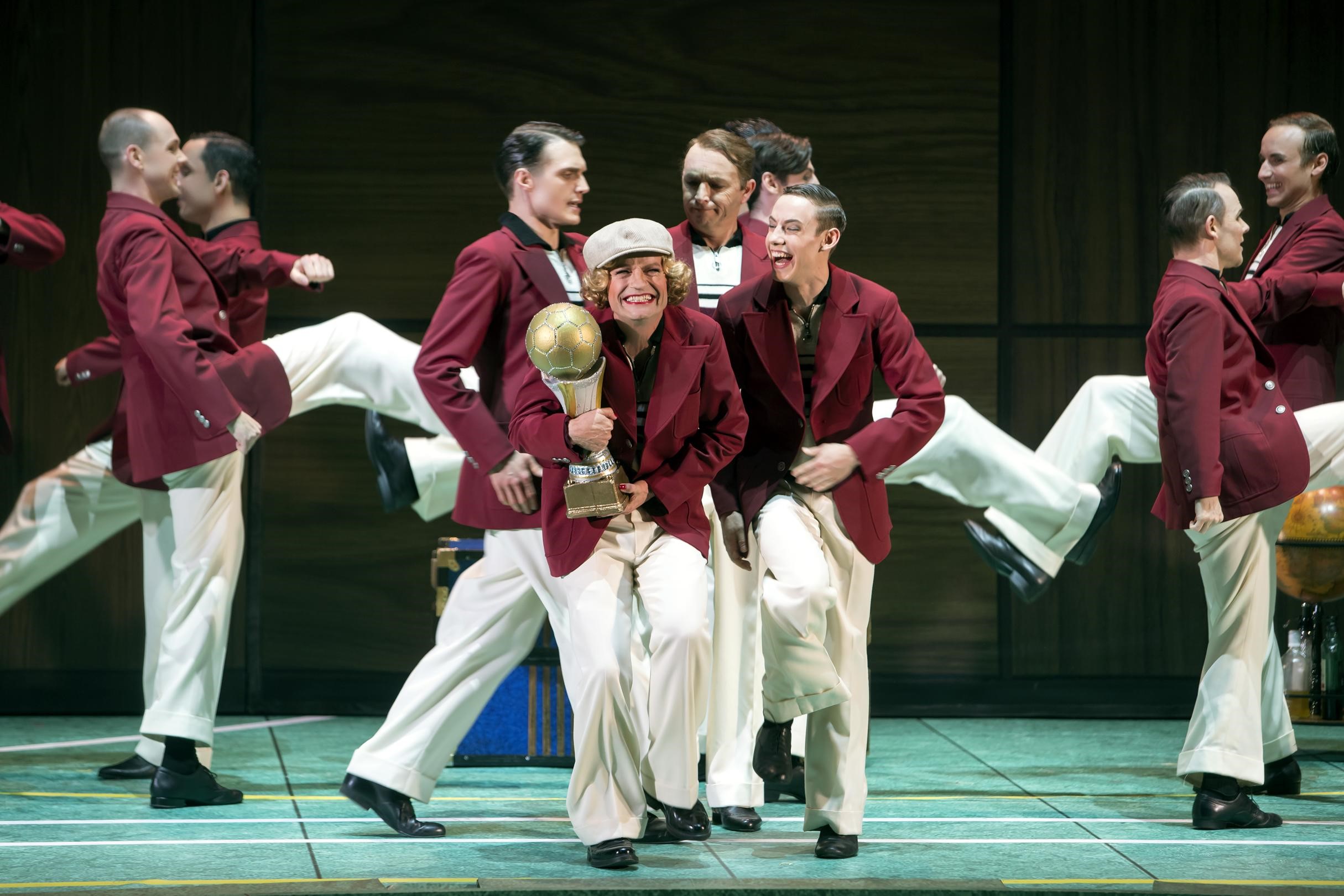
Christoph Marti as Roxy (in football uniform) and the football team, including Jörn-Felix Alt, in “Roxy und ihr Wunderteam” at Komische Oper Berlin. (Photo: Iko Freese / drama-berlin.de)
Derek Scally: I imagine international companies operate in the same “group-think” way as German theatre. As soon as a leading director among them “discovers” this repertoire, suddenly there’ll be a tidal wave of new productions. For now, I think many in the US and UK are trapped in the Nelson Eddy/Jeannette MacDonald prison. When they think of operetta they have nightmares about candy-floss and fear cavities.
And, let’s be honest, a lot of operetta’s repertoire serves this cliché. No one snorts at the ludicrous plots of the most popular operas, because the music, performances and production lift things into a new level. But you have to get to this point and, for now, the world beyond Germany is trapped in a vicious circle. No one is doing operetta in the English-speaking world because no-one has seen one – and the genre’s potential – therefore no one does it.
Richard Norton: As to why the Komische Oper and Kosky’s work is not better known in the USA, I’d put that down to the parochialism of the American press and audiences. Opera and operetta are much more central to German-speaking culture than here; many small German towns have historically had their own opera house, a tradition unknown in the US for more than 100 years. If it’s not a known work, known composer, and never before performed in English, then by default or definition, it’s obscure caviar to a music theatre elite.
Komische Oper audiences are typically younger than those for opera and operetta in the US and UK, but this is true for all opera/operetta in the German-speaking world vs. US & UK. Put that down to a lack of classical music education in the US and UK. Kudos to the Komische Oper for subtitles on seat backs in four languages, English, Turkish, French and German, even for the complete dialogue scenes of their operettas. So you can easily follow everything that’s going on.
Derek Scally: I can imagine some young theatre professionals slumming it in Berlin now, seeing Kosky’s productions, will soon be carrying the operetta bug back to the US.
Mr. Kosky has basically combined musical comedy, farce and vaudeville with syncopated operettas from the 1920s. That could be seen as something Anglo-American audiences can easily relate to, as it’s strongly connected with their own Broadway/West End traditions. Yet when the Met did Merry Widow no one dared to really try a “showbusiness” approach.
Why can’t Anglo-American companies bring their own unique theatrical performance tradition to the genre, why do they instead try to imitate a “dead” European opera tradition instead, reviving the old Richard Traubner definition of operetta as “schmaltz and kitsch,” instead of a Bob Fosse version of operetta as “all that jazz”?
Richard Norton: Yes, Kosky has combined musical comedy, farce and vaudeville with syncopated operettas from the 1920s. But his pacing, scene changes, casting, acting and directorial choices are very contemporary. Outside of Germany/Austria, “operetta” is still mired in the past. Think “Biedermeier” and you get the idea.
Derek Scally: If anyone at the Met or Opera Canada or Opera North has seen Kosky’s productions – and that’s a big if – they simply don’t like the material or think it would require too much effort to be reworked for modern audiences. Another personal theory: they may have been turned off by what often turns me off. Amid the strong direction, extraordinary costumes and sets, wonderful orchestra/orchestrations and good performers — the evenings often collapse in on themselves with a very specific schtick and hysteria that passes for comedy here in Germany.
As someone from Ireland, I find this style very hard work, very off-putting and utterly exhausting. It’s very bald, very obvious, very strained and, in my mind, at odds with the often sophisticated humor of the material beneath. Many of the operettas I’ve seen here were written as soufflé but served like latkes. Perhaps international directors are turned off by this heavy, leaden approach?
Much of Mr. Kosky’s work is based on research that has prepared the way, whether it’s on “degenerate” operetta, Nazi politics, sexual politics etc. This research is mostly in German. In 2019 Cambridge University Press has released the first operetta companion in English. Is this a sign that things might change, internationally, with regard to a queer form of operetta?
John Groves: Not living in the UK, you will probably have forgotten or never heard of the infamous Section 28 of the Local Government Act 1988 introduced by Margaret Thatcher’s Tory government to try to stop the growth of homosexuality! It prevented teachers and anyone else from telling young people (“promoting” was the word used) about homosexuality, or any discussion whatsoever! This was not repealed until 2010!
Also many British people of my generation and younger do not wish to even admit it exists, whereas ‘young’ people are far more open and accepting and inquisitive. It needs this generation to come through before a change of attitudes will be noticed in the UK. Older people often associate being ‘gay’ with child abuse – the media have a lot to answer for here, as does the Church where much seems to have occurred and been smothered: after all, sex education in UK schools was until recently always taught in Religious Education lessons! In the last 50 years, Germany has always been far more liberal. But I think the US attitude to being ‘gay’ is even more inhibited than in the UK!
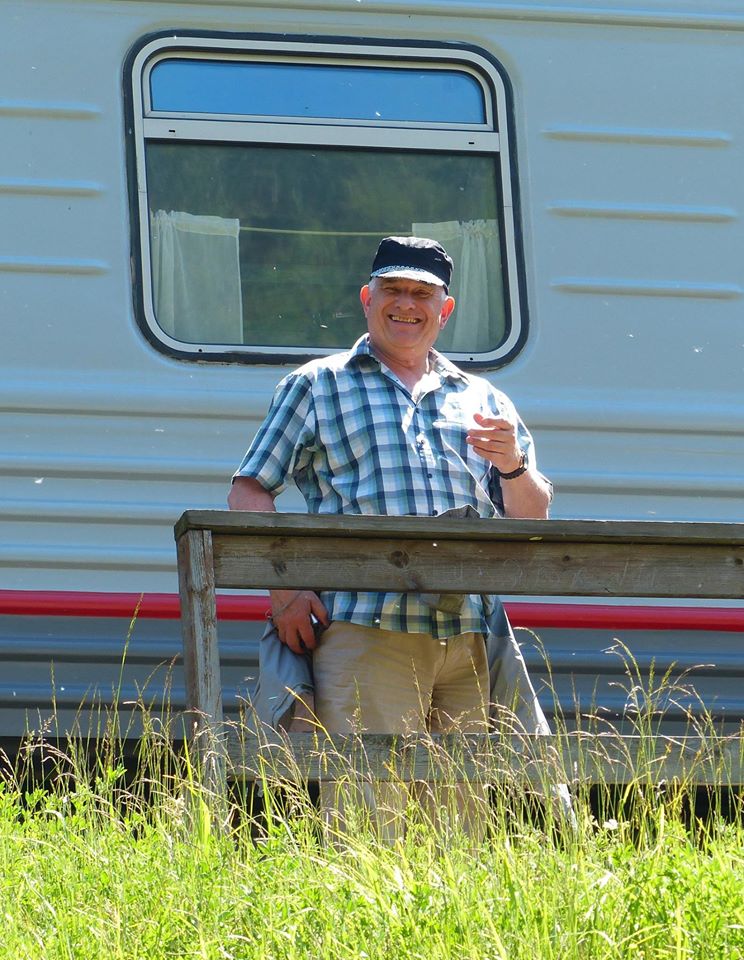
John Groves on the road, visiting operetta performances throughout Europe. (Photo: Private)
Richard Norton: Were your own book published and translated into English! Titles such as Welt der Operette, Glitter and be Gay, or your various essays on “Aufführungspraxis der Operette” or sexuality and gender in operetta. Yes, research on the subjects of Weimar operetta or “queer” operetta has a long, long way to go in English in terms of winning widespread public attention. This concept of an “operetta companion” or “musical comedy companion” or “Weimar companion” or “Cole Porter companion“ or “Gilbert & Sullivan companion“ is a new publishing concept that only seems to have taken hold in the past 10 to 15 years. A catch-all grab bag of short historical pieces paired with essays from modern day scholars. As I see it, this confers a legitimacy of sorts on popular culture from the academic press. I’m sure that the “Bob Dylan companion“ and “Rolling Stones companion“ will show up any day now.
Derek Scally: Everyone likes to be a pioneer, particularly in the creative world. No doubt someone in the English-speaking world will soon take on the role of a cultural Indiana Jones, raiding operetta’s lost ark.
In Berlin there have been other queer operetta experiments, such as Frau Luna at Tipi and Alles Schwindel at Gorki, both very successful. How would you describe the difference in style/approach and queerness?
Derek Scally: It’s hard to know at the moment if queer in theatre is a long-term reality or a short-term trend. Some productions succeed in projecting old material through a new, queer, lens with fascinating results. Other productions are clearly jumping on the bandwagon, securing funding in a zeitgeist box-ticking exercise. I think queer theory has a place in redefining and rescuing operetta, once if it is used as a tool: to brush away decades of dust that has settled on the repertoire.

Scene from “Clivia” with Christoph Marti in the title role. (Photo: Iko Freese/ drama-berlin.de)
Perhaps queer theory and direction can open to modern audiences a door that, until recently remained shut: the gender-fluid irreverence of many operettas. One problem in making this happen is how the life-sapping humourlessness of many queer theorists stands at odds with the life-affirming joy of the operetta. Queer theory in theatre can only be a means to an end, not an end in itself. If queer directors take operetta hostage for their own political agenda, they risk strangling the form just as it began to breathe again.
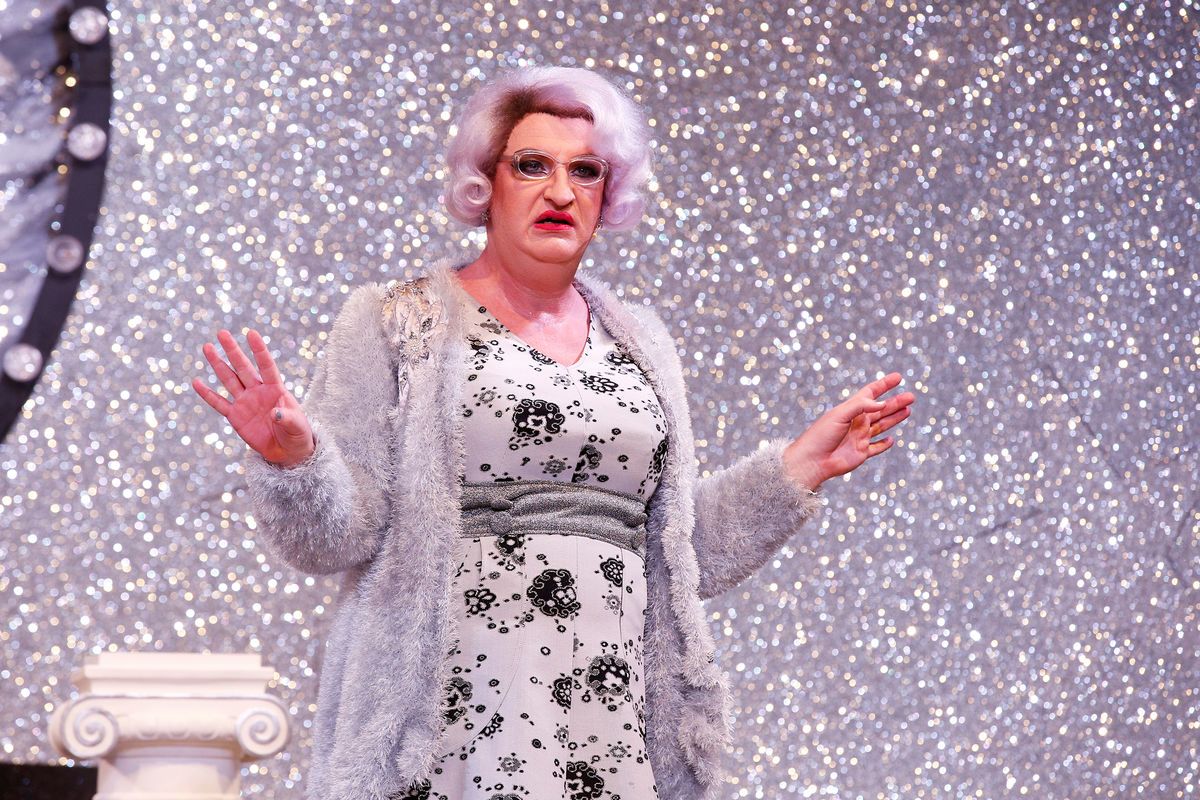
Ades Zabel in “Frau Luna” as Miss Groom. (Photo: Barbara Braun)
Are we likely to see anything like Alles Schwindel, Frau Luna, and the Kosky glories in the USA?
Richard Norton: I wish I could be more genuinely optimistic about the future of operetta, any operetta, in English in the USA. I don’t like to be negative, but try to be realistic. Unless you have a wealthy sponsor to produce it, it’s not going to happen. Were Barry Kosky to direct his Ball im Savoy in English, then where would he do it? In New York City: “Encores” at New York’s City Center for seven seven performances? Or as part of Ted Sperling’s “Master Voices” for two performances at Carnegie Hall?
Regionally, there’s Goodspeed Opera House, which is too small (300 seats), then there’s Bard Summerscape (an upstate summer venue where the new Oklahoma! started), or the Brooklyn Academy of Music (too radical modern) … I don’t see ENO, the Met Opera, or Ohio Light Opera, Opera North as likely candidates.

The London version of Abraham’s “Ball at the Savoy” with lyrics by Oscar Hammerstein II, showing Rosy Barsony on the cover.
Which means Berlin’s queer “operetta miracle” will remain something you can only enjoy in the German capital for the time being. Thank you, gentlemen, for your time and answers.
All photos from Komische Oper productions are by Iko Freese / drama-berlin.de
